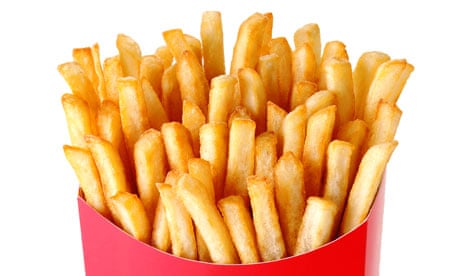"Do you want fries with that?" Not if they're made from genetically engineered potatoes, say activists who oppose GMOs.
The advocacy group Food & Water Watch is asking McDonald's, the world's biggest buyer of potatoes, not to source a genetically engineered spud that was developed by its biggest supplier, the J.R. Simplot Co.
"This potato is anything but healthy," writes Wenonah Hauter, the executive director of Food and Water Watch, in a letter (PDF) to Don Thompson, McDonald's CEO. Altering the plant's genes, she writes, could unintentionally affect other characteristics of the potato, "with potentially unforeseen consequences for human health". The letter has been signed by 102,000 people.
Other NGOs, including Friends of the Earth and the Center for Food Safety, also oppose genetically engineered food. The Consumers Union wants that food labeled. All of them argue that US government regulation of genetically modified crops is inadequate.
This is a problem for McDonald's – and for anyone who believes that genetic engineering has the potential to increase crop yields, help solve environmental problems or deliver healthier foods.
Simplot's new potato varieties, which have been branded as Innate potatoes, are designed to deliver both environmental and health benefits. They reduce black spots from bruising, which cause a portion of each year's potato crop to go to waste as unmarketable. They are also intended to make fried potatoes safer by lowering levels of asparagine, a naturally occurring amino acid that reacts with sugars at high temperatures to produce acrylamide, a potential carcinogen.
"Through the endless possibilities of Innate technology, we aspire to create better fruits and vegetables, farming and human health," Haven Baker, Simplot's vice president of plant sciences, told Biotechnology Fortified, an independent non-profit blog about genetic engineering.
A pivotal moment from GMOs
The brouhaha over Innate potatoes, which are awaiting regulatory approval, comes at a pivotal moment for genetically engineered food in the US. State-by-state battles over mandatory labeling of GMO food has pitted some NGOs and businesses against biotech companies, grocery stores and food and beverage firms like Coca-Cola and Kellogg's.
Meanwhile, companies seeking regulatory approval for genetically modified salmon and apples have run into opposition not just from NGOs, but also from conventional apple growers and retailers like Whole Foods Market. If the GMO potatoes, salmon and apples all fail in the marketplace, companies will be loathe to invest further in plant biotechnology.
As it happens, this isn't the first time a biotech company has tried to improve the lowly potato. In l998, Monsanto introduced NewLeaf potatoes, which were engineered to repel a pest called the Colorado potato beetle. (Michael Pollan planted some, and wrote a long story about his experience.) Several years later, Monsanto withdrew from the potato business after anti-GMO activists persuaded McDonald's and Frito-Lay to tell their suppliers, including Simplot, not to grow NewLeaf potatoes.
This time, McDonald's may be inclined to accept the new-and-improved potatoes because of the environmental and health benefits they promise to deliver. The company declined an interview request, but a spokeswoman told The Guardian that McDonald's decision would be guided by "food, industry and regulatory experts". If that's so, the decision should be straightforward, given the broad scientific consensus in the US that the genetically engineered crops currently on the market are safe to eat.
What's more, McDonald's supply chain already includes other food made from genetically engineered crops. There are the soybeans that go into its oil, the corn that sweetens its Coke, and the soy and corn that feed the cows that become burgers. About 93% of the soybeans and 85% of the corn grown in the US are genetically modified, according to the USDA.
Why all the fuss?
Why, then, are the Innate potatoes attracting so much attention? Critics worry that the potatoes are modified using a technology called RNA interference, or RNAi, to effectively silence the genes that instigate browning. "There is so little known or understood about this technology," says Dana Perls, food and technology policy campaigner for Friends of the Earth US. "We need to slow down."
More broadly, critics claim that neither companies nor government regulators can be trusted to thoroughly assess the safety of biotech foods. "As of now, there's no requirement for an independent third-party assessment of the risks to human health of this new RNAi technology," Michael Hansen, a senior staff scientist at Consumers Union, told me. "This is new science and we need regulation that is appropriate."
But Simplot's Haven Baker says the USDA will conduct a thorough environmental review and that an FDA review now underway is expected to deliver "an important endorsement of food safety." "Simplot's extensive testing shows these potatoes have the same nutrients, taste, and appearance as conventional potato varieties, which have been proven safe over many years," Baker says.
Sorting through these claims and counter-claims about the risks and benefit of genetic engineering is difficult, even for an informed layman. That's one of the problems with the GMO debate: It gets emotional very quickly and often comes down to questions of trust. Here the anti-GMO forces have an advantage. They can position themselves as consumer advocates – public interest groups, if you will. By comparison, the companies that favor GMOs are seen as self-interested and lacking credibility. Government regulators also, generally, don't inspire trust.
Still, the fact remains that Americans consume genetically engineered food every day, and no adverse health effects attributed to genetic engineering have been documented among humans. If McDonald's is guided solely by science, it should embrace Innate potatoes. But business doesn't work that way. For better or worse, consumer attitudes will factor into the company's decision.
So is the customer always right when it comes to GMOs? We'll soon find out.
Join the community of sustainability professionals and experts. Become a member of the Guardian Sustainable Business Network to get more stories like this direct to your inbox

Comments (…)
Sign in or create your Guardian account to join the discussion